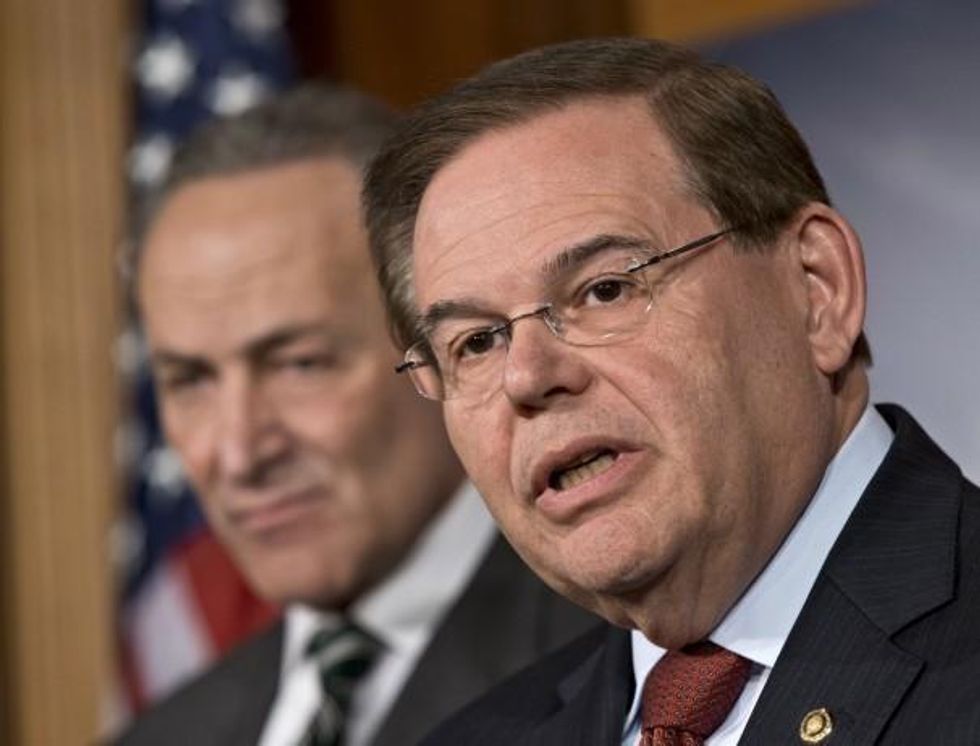On Feb. 3 The New York Times ran an article that would have been hard to imagine just a few years ago. Under the headline "Potent Pro-Israel Group Finds Its Momentum Blunted," the Times' Mark Landler reported that the American Israel Public Affairs Committee's top legislative priority, a Senate bill to cripple U.S. diplomacy with Iran, had stalled after stiff resistance from President Obama, J Street, and mobilized public opinion deeply wary of efforts to gin up another Middle East war. Landler concluded from this political development that the reach of AIPAC's political power, long an unquestioned assumption in Washington, is now in doubt.
In doing so, the president has raised questions about the effectiveness of Aipac's tactics and even its role as the unchallenged voice of the pro-Israel lobby in Washington.
This, of course, was even before Thursday's developments, in which Senator Menendez gave a speech opposing Republican efforts to bring his own sanctions bill to a vote and AIPAC publicly abandoned efforts to push the bill, which the Huffington Post reported with the banner headline, "GIVES IN."
Landler reported that 70 House Democrats have backed a letter supporting President Obama's diplomacy with Iran (you can urge your representative to join that effort here), and that former Secretary of State Hillary Clinton has also strongly backed President Obama's Iran diplomacy and opposed AIPAC's efforts to undermine it.
Strikingly, the Times cited Sen. Christopher Murphy (D-Conn.) as embodying a trend of lawmakers who are "not worried about bucking AIPAC." Indeed, Murphy has gone so far as to co-sponsor a petition with MoveOn calling on the Senate to reject AIPAC's position.
Lander noted that AIPAC's problems "go beyond Iran," citing AIPAC's failed push for war in Syria:
In September, it threw an army of lobbyists behind an effort to win a congressional mandate for Mr. Obama's threatened military strike on Syria. Facing certain failure in Congress, the president pulled the plug on the effort.
If AIPAC can lose on Syria and lose on Iran, this raises a spectacular question: Could AIPAC also lose on Israel-Palestine?
Secretary of State John Kerry recently infuriated Israeli officials by making the following statement at the Munich Security Conference about threats to boycott, sanction and divest from the Israeli occupation:
Today's status quo absolutely, to a certainty, I promise you 100 percent, cannot be maintained. It's not sustainable. It's illusionary. ... You see for Israel, there's an increasing delegitimization campaign that has been building up. People are very sensitive to it. There are talks of boycotts and other kinds of things.
What Kerry said about "boycott" has become the new normal for the Obama administration and many liberal American Jews who support the two-state solution. The rap goes roughly like this: "Personally, we, the 'good cop,' oppose boycotting the Israeli occupation. But if the Israeli government won't cooperate with U.S. peace efforts, then we won't be able to stop those 'bad cop' boycott people from increasing the Israeli government's international isolation." This drives the AIPAC supporters, to whom the idea of any pressure whatsoever on the Israeli government to comply with U.S. policy is totally anathema, absolutely wild, but it's hard to see what they can really do about it besides helplessly complain.
The administration and its supporters are just saying that the sky is blue. Is AIPAC going to demand that Congress make the administration do more to stop people from boycotting the Israeli occupation? It's one thing to insist that the U.S. government mustn't apply any pressure on the Israeli government to comply with U.S. policy. It would be quite another thing to demand that the Congress require the administration to apply more pressure on other governments and institutions to stop them from applying pressure on the Israeli government to comply with U.S. policy. Who could call for that with a straight face?
Speaking as one of the "bad cops," I find the rap of the "anti-boycott" good cops kind of funny, in a good way. The official policy of the "good cops" is to denounce me and my friends, but the more we succeed in our efforts, the stronger their case. I guess in this instance, denunciation is the sincerest form of flattery.



